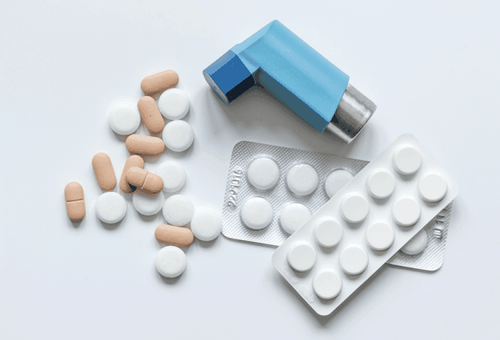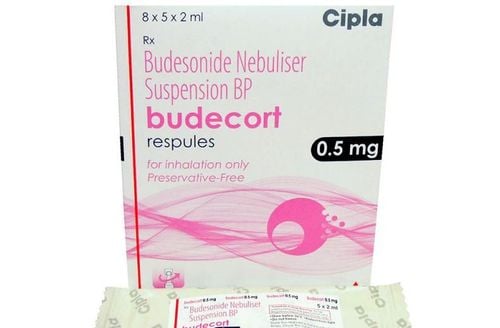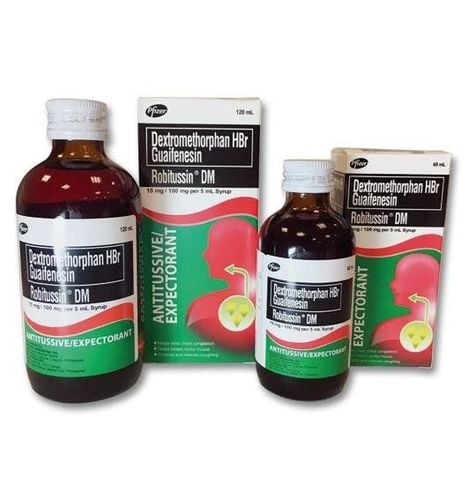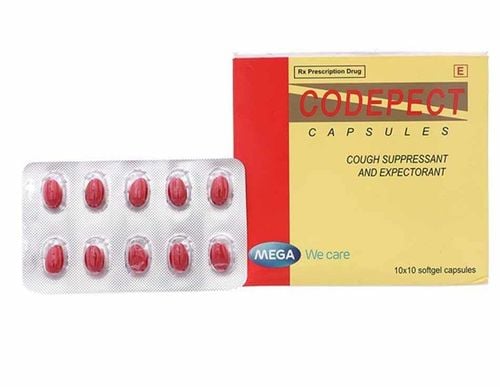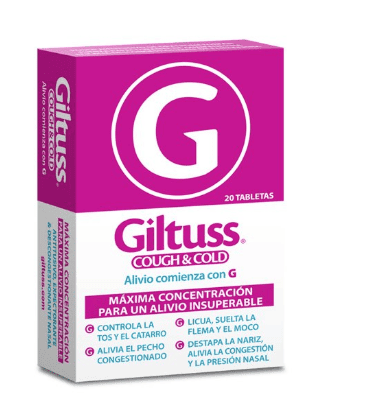This is an automatically translated article.
Expectorant is an expectorant, which helps clear mucus in the airways. Expectorant can help relieve cough or congestion caused by the common cold or flu.
1. What is Expectorant and what does Expectorant do?
Currently, Expectorant is used to treat cough and airway obstruction caused by the common cold, bronchitis, and other respiratory illnesses. This product should not normally be used for persistent coughs caused by smoking or persistent breathing problems (such as chronic bronchitis, emphysema) unless directed by a doctor. Expectorant is a prescription expectorant that works by thinning and loosening mucus in the airways, clearing congestion and making breathing easier. If the patient is self-treating with Expectorant at home, read the instructions on the package carefully before starting use.
Cough and cold products have not been shown to be safe or effective for children under 6 years of age. Therefore, unless specifically directed by the doctor, in general cases, Expectorant should not be used to treat colds in children under 6 years of age.
Besides, Expectorant tablets or capsules are also not recommended for children under 12 years of age, because it cannot cure or shorten the duration of treatment.
To reduce the risk of side effects when taking Expectorant, carefully follow all dosage instructions given by your doctor/pharmacist. Do not take more cough and cold medicines that contain similar ingredients, instead ask your healthcare provider for advice on ways to relieve cough and cold symptoms at home, such as:
Drink enough country; Use a humidifier; Use saline drops or nasal spray.
2. Instructions for using the drug Expectorant
Patients should take Expectorant as directed by the doctor, usually with a frequency of 4 hours / time, with or without food. If you are self-treating, follow all directions on the product packaging and ask your healthcare provider for answers with questions. Expectorant can have a bitter taste, so do not split the tablets unless told to by your doctor or pharmacist. Take Expectorant by swallowing the tablet as a whole, do not crush or chew it. If you are using the liquid Expectorant, measure the dose carefully with a special measuring device or spoon. Household spoons should not be used to avoid having to take medication with incorrect dosage. For Expectorant powder sachets, pour the entire contents of the sachet onto your tongue and swallow immediately, without chewing to avoid a bitter taste. Expectorant dosage is based on each person's age, medical condition, and response to treatment. Patients should not use Expectorant more than 6 doses in a day and especially do not increase the dose or take more doses than prescribed by the doctor. Drink plenty of fluids while taking Expectorant, as the liquid will help clear mucus and clear congested airways. Tell your doctor if while taking Expectorant you have a cough accompanied by fever, severe sore throat, rash, persistent headache, or a cough that persists, recurs or gets worse after 7 days... because this could be a sign of a serious medical problem that requires immediate medical attention.
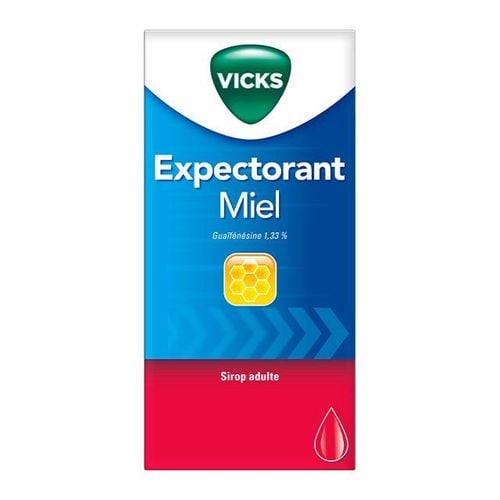
Thuốc Expectorant có tác dụng long đờm, hoạt động bằng cách làm loãng và lỏng chất nhầy trong đường hô hấp
3. Expectorant side effects
Nausea or vomiting are undesirable symptoms that can occur when taking Expectorant. If either of these side effects persist or get worse, tell your doctor or pharmacist right away. If your doctor has directed you to use Expectorant, rest assured that the benefits of treatment have been assessed to outweigh the risk of side effects you may experience. In fact, most people who take Expectorant do not experience serious side effects. Extremely serious allergic reactions to Expectorant are very rare. However, seek medical attention immediately if you notice a rash, swelling/itching (especially in the face, tongue or throat), severe dizziness, and trouble breathing. In addition, if you experience other effects of Expectorant not listed above, contact your doctor or pharmacist for examination and treatment.
4. Warnings and cautions when using Expectorant
Before taking Expectorant, tell your doctor or pharmacist if you are allergic to Expectorant or any other allergic condition. Allergic reactions or other medical problems may occur due to the inactive ingredients contained in this product.
Your doctor or pharmacist also needs to know your medical history in advance, especially:
Breathing problems, including emphysema, chronic bronchitis, asthma, smoking cough Cough with blood or lots of phlegm. Expectorant liquid may contain sugar and/or alcohol, so caution should be exercised in people with diabetes/liver disease as these must be limited/avoided in the diet.
Expectorant liquid and powder packs may also contain aspartame. Therefore, people with phenylketonuria (PKU) or any other condition that need to limit their consumption of aspartame (or phenylalanine) should consult their doctor or pharmacist for instructions on how to use it safely.
Before surgery, tell your doctor or dentist about all prescription, over-the-counter and herbal products you are using. Expectorant should be used by pregnant women only when absolutely necessary, after having been weighed by a doctor about the risks and benefits.
It is not known whether Expectorant passes into breast milk. So before breastfeeding, you and your doctor also need to evaluate the risks versus benefits of taking the drug.
5. Expectorant drug interactions with other drugs
The effects of some drugs may change if they are taken with other medicines at the same time. This also increases the risk of side effects or makes the medication no longer effective. Although potential risks exist, drug interactions do not always occur. A doctor or pharmacist usually prevents or controls most interactions.
For the best care, be sure to tell your healthcare provider about all the medicines you use before you start treatment with Expectorant. While using this product, do not start, stop, or change the dose of any other medicines without your doctor's approval.
The active ingredient guaifenesin in Expectorant is available in both prescription and over-the-counter products. So you need to check the labels of all medicines to make sure you are not taking more than one product containing guaifenesin at the same time.
Expectorant can also affect the results of some tests, so tell lab staff and all doctors if you take this medicine. The best way is to write down a list of all the medicinal and herbal products you are taking and then show it to your healthcare provider.
6. Other notes when using Expectorant
6.1. Overdose and missed dose Call 911 immediately in case of overdose and severe symptoms (eg, unconsciousness/difficulty breathing).
When you forget a dose of Expectorant, take it as soon as you remember it. However, if it is almost time for your next dose, you can skip the missed dose and continue taking it at the usual time and dose.
6.2. Storage Store Expectorant at room temperature, away from light and moisture, out of reach of children and pets. Do not store in the bathroom, do not freeze liquid Expectorant. Different brands have different storage needs. So you need to check the product packaging for proper storage or ask the pharmacist directly. Dispose of the product properly when it has expired or is no longer needed.
Finally, do not share Expectorant with others if you have been prescribed it by your doctor. Make sure your physical exam and all tests are on schedule. Expectorant should only be used temporarily, not for more than 7 days unless directed by your doctor. Tell your doctor if your cough lasts more than 1 week.
Please dial HOTLINE for more information or register for an appointment HERE. Download MyVinmec app to make appointments faster and to manage your bookings easily.
Reference source: webmd.com




